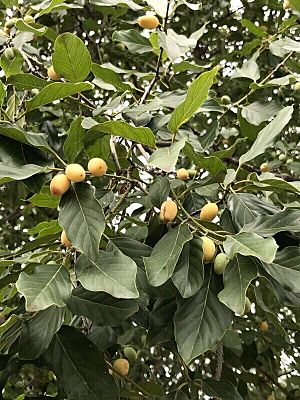Phyllogeiton discolor facts for kids
Quick facts for kids Phyllogeiton discolor |
|
|---|---|
 |
|
| Conservation status | |
| Scientific classification | |
| Genus: |
Phyllogeiton
|
| Species: |
discolor
|
| Synonyms | |
|
List
|
|
The bird plum or brown ivory is a special tree. Its scientific name is Phyllogeiton discolor. It grows naturally in southern and eastern Africa, including the island of Madagascar. This tree is well-known for its yummy fruits and strong wood. It can grow quite tall, reaching up to 18 meters (about 59 feet) high.
Contents
Discovering the Bird Plum Tree
What the Bird Plum Looks Like
The bird plum tree is a broadleaf tree. This means it has wide, flat leaves. It can grow very tall, reaching heights of up to 18 meters (about 59 feet). That's like a six-story building!
The Tree's Delicious Fruits
The fruits of the bird plum tree look a bit like dates. They are sweet and have soft flesh around one or two flat seeds. People sometimes sell these fruits in local markets. They can be eaten fresh, or dried and crushed into a powder. This powder is then added to a thick porridge called pap to make it taste sweet. Many animals also enjoy these fruits. Monkeys, baboons, and different kinds of birds love to eat them.
How the Bird Plum Helps Animals
The leaves of the bird plum tree are a favorite food for many animals. Elephants, giraffes, and several types of antelopes eat them. Farm animals like cattle also enjoy the leaves. Because so many animals eat the leaves, you can often see a clear "browse line" on the trees. This means the lower leaves are eaten away, leaving a distinct line where the animals can no longer reach.
Many Uses of the Bird Plum Tree
The wood from the bird plum tree is very hard and beautiful. People use it to make many things. It's great for building furniture and houses. It's also used to make charcoal, which is a type of fuel. People create beehives from the wood. It's also popular for making crafts and tools, like handles for tools and pestles for grinding food.
Besides its wood, the Phyllogeiton discolor tree has other important uses. People use parts of the tree to make natural dyes. It's also used as fodder, which means food for livestock. Sometimes, it's planted just because it's a beautiful ornamental tree. The tree is also used in traditional herbal medicine. For example, the Himba people cook the bark of the tree to help treat nausea and diarrhea.
 | Charles R. Drew |
 | Benjamin Banneker |
 | Jane C. Wright |
 | Roger Arliner Young |


